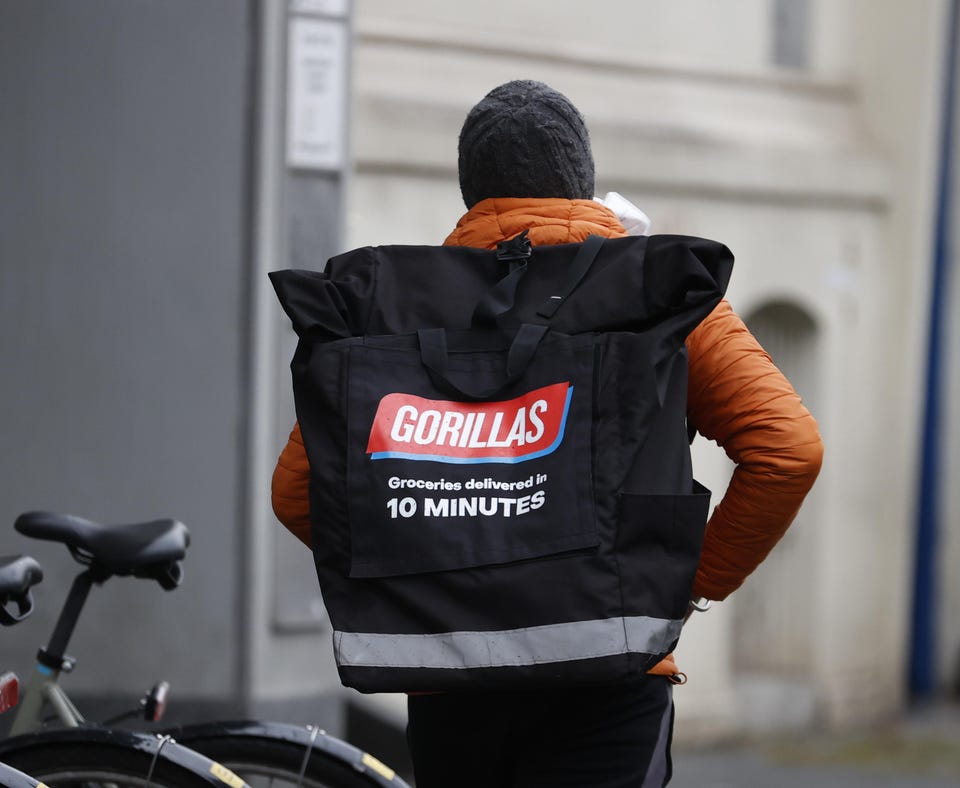Consumer Tech Lay-Offs At Gorilla’s Street Fleet Signal More Tough Times Ahead For Grocery Delivery Jonathan Keane Contributor Opinions expressed by Forbes Contributors are their own. Freelance technology journalist covering the gig economy. New! Follow this author to improve your content experience.
Got it! Jul 8, 2022, 02:00am EDT | Share to Facebook Share to Twitter Share to Linkedin BERLIN, GERMANY – DECEMBER 30: Food delivery services members such as Gorillas, Foodpanda and Getir . . .
[+] serve their customers in Berlin, the capital of Germany on December 30, 2021. Since the first days of the novel coronavirus (Covid-19) pandemic, the demand for online order applications and courier deliveries has increased due to the closures and restrictions applied for precautionary purposes around the world. (Photo by Abdulhamid Hosbas/Anadolu Agency via Getty Images) Anadolu Agency via Getty Images It has been another turbulent week in the world of grocery delivery, this time with Gorillas facing down lay-offs and complaints over pay.
Like much of the industry, the Berlin-based rapid grocery delivery firm, which is valued north of $1 billion, has been contending with an increasingly challenging market of late. This week Sifted reported that Street Fleet, a delivery rider platform that is owned by Gorillas, had laid off more than 100 workers. The platform provides delivery riders to Gorillas and other companies like Delivery Hero, which is a shareholder in Gorillas.
Street Fleet also met with allegations from workers in recent weeks over unpaid wages. In response to queries about the pay issues, a spokesperson for Gorillas said that “this issue has been resolved. ” “All Street Fleet riders have been fully paid,” he said, adding that some that worked for Street Fleet have now been hired by Gorillas.
However he did not specify how many people have been hired. It is the latest chapter in a quickly evolving tale for grocery delivery start-ups that first shot to fame with large VC funding rounds in 2020. Gorillas very quickly became a so-called ‘unicorn’, achieving a billion-dollar valuation just months after launching.
It and several other start-ups, operating rider fleets and warehouses stocked full of goods for delivery within 15 minutes, rose up around Europe. Many benefitted from the lockdown environment and the sharp increase in online shopping. MORE FOR YOU Google Issues Warning For 2 Billion Chrome Users Forget The MacBook Pro, Apple Has Bigger Plans Google Discounts Pixel 6, Nest & Pixel Buds In Limited-Time Sale Event Now the mood has changed considerably for the sector.
Gorillas announced lay-offs in late May and that it would be pulling out of several markets in a bid to steady the ship towards profitability. It remains active in Germany, France, the UK and the US. A similar path has been taken by its rivals Getir and Zapp, which laid off about 14% and 10% of their workforces respectively.
Others like Jokr pulled the plug on its European operations entirely while UK start-up Dija was bought out by Gopuff. Across the food and grocery delivery sector, start-ups are buckling up for a tougher economic environment as inflation bites on household costs and a drop in discretionary spending. The next major test for many companies will be raising further VC money in this landscape when investors become more reserved with their checkbooks compared to a year ago.
Follow me on Twitter . Jonathan Keane Editorial Standards Print Reprints & Permissions.
From: forbes
URL: https://www.forbes.com/sites/jonathankeane/2022/07/08/lay-offs-at-gorillas-street-fleet-signal-more-tough-times-ahead-for-grocery-delivery/



